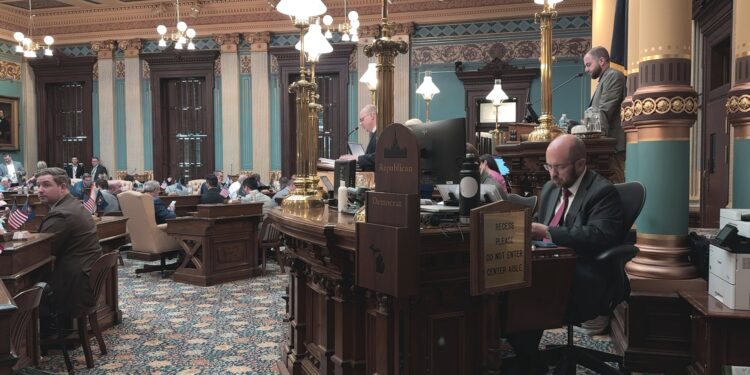LANSING, Mich. (WZMQ) – Michigan lawmakers left the Capitol on Tuesday without reaching a deal on the state budget, missing a critical deadline and leaving key funding decisions unresolved as they head into a two-week legislative break.
Under state law, the Legislature is required to pass a balanced budget by July 1. Despite long hours at the Capitol and behind-the-scenes discussions over the weekend, House Republicans and Senate Democrats remain deeply divided, not only on priorities but also on how to structure the overall budget.
“We look forward to continuing that productive conversation to come to a solution on not just the K-12 budget, but other priorities for our state and the general fund budget,” said Senate Majority Leader Winnie Brinks (D-Grand Rapids).
On Tuesday, both chambers met, but the Senate adjourned before the House, signaling little expectation for a last-minute agreement. House Republicans remained in session for three more hours, working on changes to the Senate’s K-12 budget proposal, but ultimately left without taking a vote.
“We were here. We were ready to do the job,” said Rep. Dave Prestin (R-Cedar River). “We were actually looking forward to hopefully striking the deal on K-12, higher ed, and possibly roads to boot, and the Senate is already gone.”
House Democrats expressed frustration with the lack of progress, blaming Republican leadership for not contributing to productive negotiations.
“We could have all predicted this,” said House Minority Leader Ranjeev Puri (D-Canton). “But there wasn’t really a plan to get a viable option on the board, and we’ve wasted seven or eight hours of everyone’s time to do nothing.”
Senator Darrin Camilleri (D-Trenton), who chairs the Senate’s K-12 budget subcommittee, said his chamber is ready to send its version of the school aid budget to the governor if the House passes it unchanged. But he warned that any significant revisions would send negotiations back to square one.
“If they sub it out with a different bill that we have not seen, that is contrary to our values; it just again continues this conversation in a way that excludes all of the partners at the table,” Camilleri said.
The two sides do appear to agree on boosting per-pupil funding for schools, but how to achieve that remains a sticking point.
Senator Brinks said school leaders have emphasized that they would rather see a well-crafted, complete budget passed later than a rushed one now.
“It makes sense to contemplate the whole altogether, and it’s difficult to do it piece by piece without having some answers on how it impacts other pieces,” Brinks said.
Unlike last year, when lawmakers finalized the full state budget in a single night before the deadline, this year the House has yet to introduce any general budget bills beyond school funding and roads. Higher education and community college budgets remain on hold.
Lawmakers are not scheduled to return to session until July 15. If a K-12 budget deal is reached, they will still face the challenge of passing the remaining departmental budgets before the new fiscal year begins October 1.


















